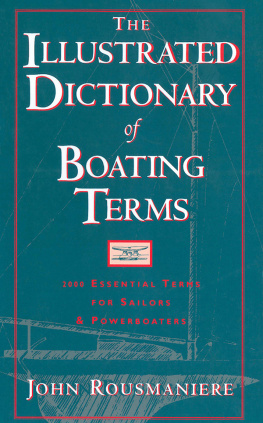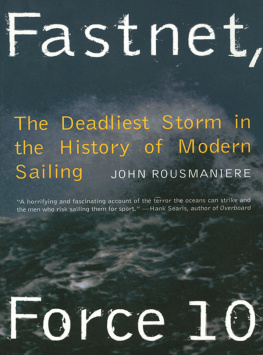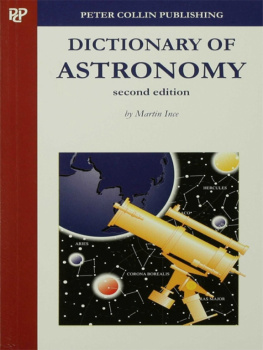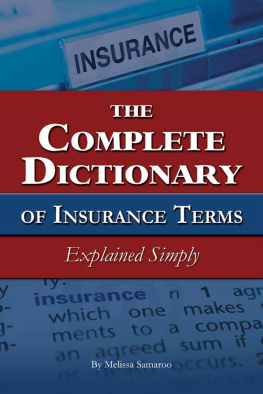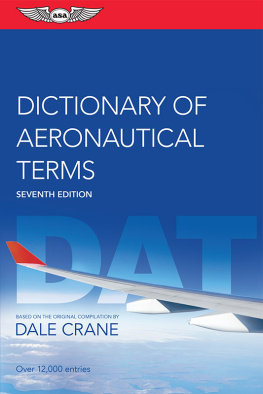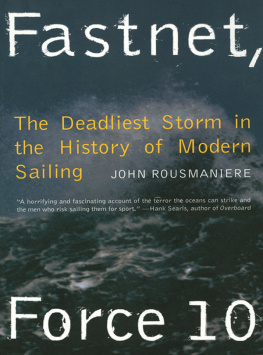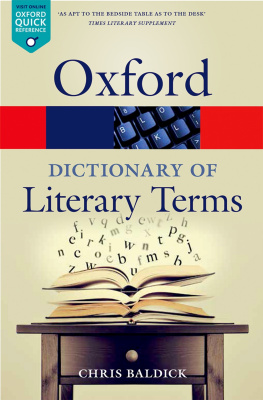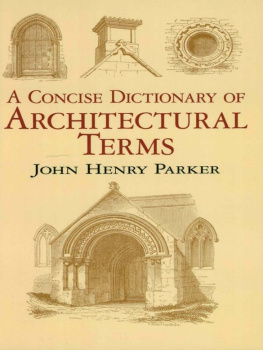T HE
I LLUSTRATED
D ICTIONARY
of
B OATING
T ERMS

Contents
To Dad, again and always
F ROM ABACK TO ZULU, including words as new as bowrider and as old as starboard, here is the current language of pleasure boatingmore than 2,000 new, recent, and classic terms and their cousins that todays power-boaters and sailors rely on to make their way safely and happily upon Americas inland and coastal waters. In writing these definitions, I have drawn from my own broad experience and reading. To be sure that the book is up-to-date I also carefully reviewed recent issues of several American power and sail magazines and incorporated the new words I found there.
In the interest of full disclosure, I should indicate my two main prejudices. First, I generally do not prefer land-bound words when good seagoing terms do the job. I cringe at the current trend of saying drive in place of steera healthy, clear seafaring term vastly preferred to its clanky automotive cousin. Second, I favor gender-neutral language when it is not awkward. Because boating language was created by males, its traditional vocabulary is peppered with terms like helmsman and man overboard, but today these words are wrong about half the time. Therefore I suggest more accurate and inclusive terms, but only if they are not ungainly, for instance steerer and crew overboard (in place of helmsperson and person overboard).
Regardless of my preferences, all options are included. Youll find helmsman and man overboard here (and even drive).
A F EW W ORDS A BOUT A L IVING L ANGUAGE
T O PEOPLE WHO COMPLAIN that recommending steerer over helmsman is taking liberties, I can only reply that there already have been plenty of liberties taken. The bubbling up of new terms is one of the facts (and, I think, glories) of the boating language.
Developed spontaneously wherever boats go, the sailors and powerboaters language is fascinating and often perplexing in its ingenuity and variety. Of course, many terms have universal meaning because they are crucial to safety and good seamanship. Starboard always refers to the right side of the boat, port to the left. Any skipper who confuses the two will immediately get into trouble. The same rule applies to bow and stern, sheet and halyard, forward and aft, and a number of other words it is best not to confuse or forget in moments of difficulty. But otherwise, there is a broad choice of accepted terms and meaningsmany of them extremely inventive and appealing. Some old narrow usages are being expanded. A hawsepipe or hawse, for example, traditionally is a hole in the bow for the anchor rode or for a hawser, which is an especially large docking or towing line. We still have hawsepipes, except that today, they also include holes in a small powerboats rail near the stern for leading docking lines. Same word, different ends of the boat, and pretty much the same meaning.
Some terms are close to poetic. Everybody is familiar with the term raging storm. In the Bahamas, the storm itself is called a rage. And when boats are difficult to steer, just like stubborn people they are called cranky. Other words are wonderfully picturesque. Sailors use a variety of expressions to describe sailing extremely close to the wind, with the sails luffing slightly. Some say they are pinching or squeezingliterally compressing the wind between the sails and the axis of its direction. Other sailors speak of feathering; as they luff, the sails lift and fall like a feather in the breeze.
And there always is the beauty of simple pragmatism. A very light sail set in a calm in order to pick up gossamer wisps of wind is a windseeker. When a powerboat rolls from side to side, she is described as doing a chine walkputting down one chine (the meeting place of the bottom and side), then the other, then the other. When you go out in a boat during the winter, you are frostbiting. And there can be no better name for a strong fitting to take a docking line than samson post, which, unlike the Biblical strongman, cannot be weakened by a haircut. In many parts of the boating world, powerboats are either cabin cruisers or open boats. But recently, in an interview on National Public Radio, an official at a lock on a Texas river used the term deck boat when referring to a larger powerboat. Deck boats, he said, have fishing towers and American flags and everything.
The origins of some terms are fascinating. Take starboard. In ancient times, before the invention of the rudder, German and Norse boats were steered by oars that were located on the right-hand bord, or side, presumably because most people are right-handed. In order to avoid breaking this valuable oar, when they docked seamen put the boats left-hand side against the ports wharf. In time, the boats right side came to be called the steering side, or steorbord (the ancestor of our starboard) and the left side became the port side. Other terms honor the inventors or the place of origin of equipment. The Cunningham, for example, was reportedly invented by a fellow named Briggs Cunningham, and the genoa jib was first used publicly during a race in the Mediterranean off Genoa, Italy.
Then there are words whose sheer variety or complexity can make them confusing. Some meanings share a single word (see run), and a few terms have odd pronunciations (a pendant is a pennant, a mainsail a main-sul). The following terms all mean to alter course toward the wind direction: head up, harden up, come up, round up, freshen your wind, sharpen up, sharpen your wind, heat it up. On every boat you will hear one or two of them, each within a specific context.
Even the act of naming a boat is replete with choices. As you will see in the section boat names, your dream vessel may be the Pageant and an it if you think of it as a great ship, or Pageant and she if the relationship is more intimate.
These shifts, like so many in the nautical language, are subtle, in common use, and generally acceptable. Read on, and decide for yourself.
J OHN R OUSMANIERE
S TAMFORD , C ONNECTICUT
N OVEMBER 1997
A G UIDE TO U SING T HIS D ICTIONARY
If you see an undefined term in one definition, its usually defined in its own definition. For example:
measurement system A rating rule.
If you dont know what a rating rule is, look for it under R.
These words are specific to boats. A small number of basic meteorological and mechanical terms appear, but only in a boating context.
A single definition covers alternative terms. For example:
sound signal, whistle signal, horn signal The sound made by a whistle or horn.
And under whistle signal and horn signal you will find:
horn signal See sound signal.
whistle signal See sound signal.
If you cant find a two-word term under one word, try the other. Youll find anchor rode under anchor and sidestay under stay.
Large families of related terms are grouped. See, for instance, anchor, fore (forward), and propeller.
Many words serve both as nouns and as verbs.
Some words have multiple meanings. These are sorted out in the definition. The simple word
Next page
